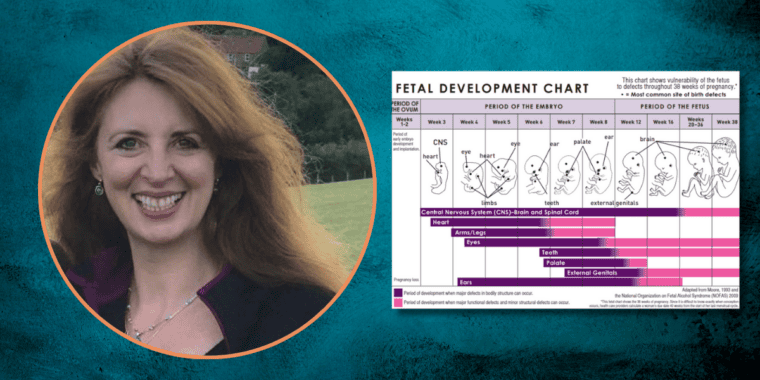
FASD is a life changing disorder. It stands for Foetal Alcohol Spectrum Disorder and it’s a surprisingly common condition. It is caused by drinking alcohol in pregnancy. Studies suggest FASD affects at least 3.6% of the UK population (McCarthy et al, 2021, McQuire et al 2019). This means that 1 child in every classroom is likely to be affected by FASD.
Many mothers-to-be don’t realise during the first few weeks that they are pregnant or didn’t plan to get pregnant in the first place. Most people in the UK do not know the severe harm that drinking alcohol in pregnancy can cause to the unborn baby.
When a pregnant woman drinks any alcohol, the alcohol in the bloodstream crosses the placenta and affects the baby. Doctors and midwives agree that drinking alcohol in pregnancy increases the chances of miscarriage, premature birth of the baby, having a stillbirth – even after a safe delivery, as well as the chances of cot death or Sudden Infant Death Syndrome (SIDS). An unborn baby does not have a mature liver to process and detoxify alcohol. An important point to remember is that the baby’s brain develops throughout the whole pregnancy and not just the first few months. The harm caused to the baby therefore depends on which organs and which brain functions are developing at the time the alcohol is drunk.

There is no safe time and no safe amount to drink during pregnancy as alcohol can harm the baby throughout.
FASD is a spectrum disorder. This means that everyone who has FASD displays the symptoms in different ways. Some people may have severe problems whilst others may only be mildly affected. Less than 10% of people with FASD will have the facial characteristics. This is because the structure of the face develops in very early pregnancy, so only drinking in that timeframe will cause the classic sentinel features of foetal alcohol exposure. It is important to remember that most children with FASD will look like any other child in the classroom. This is why FASD is known as a hidden disability and often goes undiagnosed.
Diagram to show the physical features of foetal alcohol exposure

Individuals with FASD can have over 400 possible symptoms. These may include:
- Physical health problems affecting any part of the body
- Severe difficulties with movement and co-ordination
- Problems understanding instructions
- Struggling with friendships and social interactions
- Difficulties in school and work environment
- Finding it difficult to concentrate and focus
- Organising themselves in daily life
- Poor sleep
Due to the developmental delay caused by alcohol harm to the brain in pregnancy, parents, carers and professionals are advised that their child or young person will behave more like a child half their age. An 18-year-old person with FASD may look like anyone else of their age but their skills and abilities may vary from their friends who do not have FASD. They may act in ways that are more expected of a 9-year-old when it comes to coping at school and making friends, for example.

In 2022, the National Institute for Health and Care Excellence (NICE) released the FASD Standard for England and Wales. This quality standard includes assessing and diagnosing FASD in children and young people. It also advises support before and during pregnancy to prevent FASD.
FASD is preventable. It is important if a woman finds out she is pregnant and has been drinking alcohol that she stops consuming alcohol. Women are encouraged to speak openly with their midwife or GP for care, support and advice.
The good news is that children and adults living with FASD can live happy and productive lives if their FASD is identified early and they get the right support. People with FASD can have many skills and talents and may excel in sport, music or the arts for example. Often vocational occupations are best suited to people living with FASD, especially where they can work to their strengths and interests.
Key Messages
- We all need to raise awareness of FASD and the risks of alcohol harms in pregnancy.
- Alcohol passes through the placenta so whatever a woman drinks the baby drinks too.
- There is no safe time or harmless amount of alcohol to drink during pregnancy or when planning a pregnancy. No alcohol is the safest option.
Written by Dr Helen Howlett, Head of Community and Children and Young People, Women’s Health Champion and FASD Specialist, North East and North Cumbria NHS.
All IAS Blogposts are published with the permission of the author. The views expressed are solely the author’s own and do not necessarily represent the views of the Institute of Alcohol Studies.
